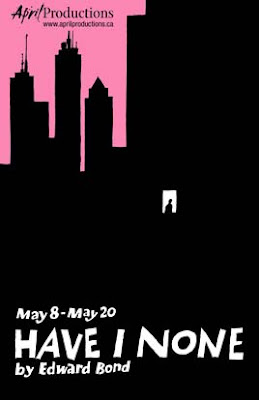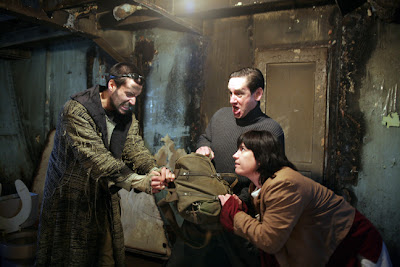1) What the fuck is going on?
I’m acting in a recent play by iconoclastic British theatre god and establishment refusenik Edward Bond. It’s called Have I None, and is a dystopia set in the near future. Needless to say, it doesn’t paint a very pretty picture of human nature, but it is shot through with absurd, dark humour. Also, though politically situated, it is essentially a domestic tragedy played out in one couple’s very severe living space. We’re doing it in the rusted-out basement hull of Captain John’s Harbour Boat Restaurant at the foot of Yonge Street! Note: This is most assuredly NOT dinner theatre fare.
2) What are the best and worst things about doing a play on a boat?
The best thing is – well, we’re on a friggin boat. Man! It’s kind of exotic. Nice to be so near the water. We got to rehearse in the space, and the built-in atmosphere did all the neo-Stanislavskian-given-circumstances-sense-memory- physical-action actor’s work for you. Whew. Nothing left but rigorous dialogue and whacked-out characters.
The worst thing is – well, we had to rehearse in the basement of the ship . . . ALL DAY LONG! Yuck. Horrible air. No light. Freezing cold before the weather changed. An amazing environment for a 70-minute show – a little challenging to ‘live’ in. We all got sick.
3) What does the title of the play, Have I None, refer to?
It refers to human desire, selfishness and possession in the face of a denuded, catastrophic natural and political environment. What happens when nearly everything that stabilises our finer human impulses is swept away or severely controlled? In this world, all human markers have been outlawed to preserve the remnants of civilization: no art, no photos, no family relationships. As Bond says – “they abolished the past.”
4) Why do you think audiences and storytellers are so interested in apocalypse narratives?
We always have been, that’s for sure. Ask the next Medievalist you bump into. Certainly, we’ve been fascinated by them since Hiroshima and the Holocaust – these events can never be overestimated. Lately, science (and our good senses) is telling us that collapse is around the corner. What else is there to talk about, really?
 5) If the character you play in the show was a real person, what would you like least about him?
5) If the character you play in the show was a real person, what would you like least about him?
Pretty much everything. He’s a nasty bit of work. “Petty Dictator” springs to mind. At least he’s funny, occasionally.
6) Who’s funny?
I just told you! He’s funny – Jams: the character I play! Actually, the “stranger” who enters the couple’s midst is funnier. He’s actually a nice guy in a shitty situation. Ho ho ho! Watch him squirm!
7) Do you think class issues are getting in the way of independent theatre appealing to a broader audience?
This is an interesting question. Kind of deep. I think class issues are getting in the way of a vital theatre – period. Theatre’s expensive to produce. It’s time- and labour-intensive. It doesn’t make money unless it appeals to a very safe and bland middle-ground aesthetic and political sensibility. You can’t afford to really advertise independent theatre well, and working people can’t really afford to go to it. It needs to be heavily subsidized, and our culture in Canada doesn’t really value art.
8) Have you noticed any major changes in Toronto’s theatre scene since you started working in it?
Well, there were no blogs – like this one! You had to cut-and-paste rewrites by hand with actual scissors and glue. You could smoke in rehearsals. Seriously, though, when I was a young thing on the scene in the mid-80s – it was the last time up-and-coming theatres could expect to access stable operating funds through the councils. Groups like Theatre Columbus, Crow’s, Theatre Smith-Gilmour were the last ones to establish themselves on any kind of firm ground. It wasn’t unheard of to be able to rehearse even small shows for five or six weeks. The neo-con thing killed all that.
Now, young artists are thrust out into the ceaseless hustle of “fringe” producing experiences. Some interesting things have happened from that, but, y’know, it really doesn’t let artists mature and aspire to excellence.
9) Do you have any unifying theories about performance?
No. The time of the great “isms” has passed. The great 20th century art movements. The only thing that unifies performance activities is political repression, and we don’t have enough of that in our soft society. Not overtly, anyway. It’s still about the actor and the audience in real time, I guess. New media and digital experimentation – well, we’ll see. Maybe we’re in the middle of a revolution. It’s hard to know when you’re in the middle of it.
10) What do you know now that you wish you knew when you were younger?
That most people in Canada don’t really care about theatre that much. There’s really not much of a sustaining industry. This includes the media. Not too much happens, in the end. If I’d known that, I wouldn’t have wasted so much time and emotional effort trying to “build a career.” I would’ve just got on with the work, knowing it was a rarefied interest with its own rewards.
And, oh yes – don’t waste time trying to impress people. Sigh. Young people are always trying to make an impression.
